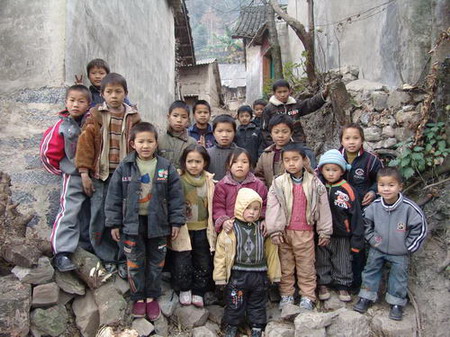Migrant workers 'have 20m' kids back home
By Wang Shanshan (China Daily)Updated: 2007-01-29 07:04
 Eighteen children pose for a picture at a village in Ziyun Miao and Buyi Autonomous County in Southwest China's Guizhou Province, January 22, 2006. Among them, twelve children's parents left the village to work in big cities in coastal areas. [Zhao Hui/Guizhou Metropolis Daily] |
More than 20 million children live with their grandparents or other relatives because their parents have migrated to other provinces in search of work, with many among them being forced to live alone.
According to a recent China National Children and Teenagers' Working Committee report, in agricultural provinces like East China's Anhui Province, as much as 22 percent of the children's parents have migrated and the number is increasing.
And many of these parents' children suffer from loneliness, perform poorly at school and are prone to juvenile delinquency, it said.
The local media often reports their tragedy. One such case was the death of a 12-year-old in Suzhou of Anhui. The boy killed himself by drinking pesticides last year because he had no one to advise him how to solve his problems, according to his suicide note.
Though the working committee has vowed to organize the children into clubs and find them "acting parents to tackle the problem," their huge number means it could take years before such an arrangement is possible throughout the country.
 Click to view the slideshow about China's migrant workers |
A survey in Chaohu, in Anhui last year showed that migrating parents had left behind 116,000 children. About 952,000 people, including 55,000 couples from the paddy cultivation area, have migrated from Chaohu, according to Yu Zupeng, an official of the provincial committee of the Chinese Peasants' and Workers' Democratic Party, which carried out the survey.
About 1 percent, that is, more than 1,000, of these children have no guardians. Such children have little communication with their parents: most Chaohu migrants talk to their children over the phone just once or twice a month, and return home only during Spring Festival. Some don't even do that, the survey said.
Deprived of parental love, many such children prefer staying alone and often become rebellious. For instance, a girl in Chaohu set her grandparents' house on fire last year because she felt they couldn't understand her feelings.
They often feel frustrated at school, too. A recent survey on the 72 junior high schools in Wuwei County of Chaohu has showed that 80 percent of those who flunked the senior high school entrance exam in 2005 were such children, Yu said.
Another survey, conducted in Tangchi Town Junior High School of Lujiang County in Chaohu, showed that less than 1 percent of such children passed the senior high school entrance exam.
Also, only 4 percent always did well at school, whereas 64 percent remained at a mediocre level and 32 percent often failed in exams.
If the government wants to help these children, it should first make it easier for them to study in the cities where their parents work, Yu said.
(China Daily 01/29/2007 page2)
|
||
|
||
|
|
